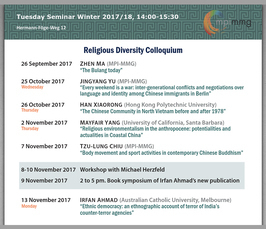"Tribes, guerillas, de-facto states: militarism in the China-Burma borderlands, and militarism in anthropology"
Religious Diversity Colloquium Winter 2017/18
- Date: Dec 12, 2017
- Time: 02:00 PM - 03:30 PM (Local Time Germany)
- Speaker: Hans Steinmüller (London School of Economics)
- Hans Steinmüller is a specialist in the anthropology of China. He has conducted long-term fieldwork in the Enshi region of Hubei Province in central China, focusing on family, work, ritual, and the local state. The main object of his research are the ethics of everyday life in rural China, but he has also written on topics such as gambling, rural development, and Chinese geomancy (fengshui). Recently he has started a new research project about militarism among the Wa people at the China-Burma border.
- Location: MPI-MMG, Hermann-Föge-Weg 12, Göttingen
- Room: Conference Room

For more details please contact vdvoffice(at)mmg.mpg.de.
Until the 1960s, the societies of the Wa hills of Burma were organised along the lines of lineage and village. In the 1970s and 80s the guerrilla army of the Communist Party of Burma retreated into these hills and established the first supra-village government structures. In 1989 the United Wa State Army, replaced the Communist Party of Burma and established a de-facto state at the Chinese border, which lacks international recognition but remains relatively independent from the Burmese national government and army. The main elements of state formation in this part of the world have to do with changing forms of militarism. This presentation deals with policies of conscription, military discipline and the promotion of ethno-nationalism in particular. The focus on militarism provides a corrective to theories of state-formation emphasising knowledge and bureaucracy.